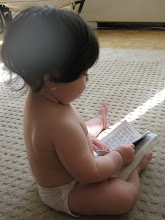Why is it okay for us to act one way in front of our children at home, and then act in a completely different way in front of our children in public?
Well, according to Judaism, it's not.
Rabbi Twerski writes in his book, 'Positive Parenting', that our children are more likely to do what we do, rather than what we say.
It seems so obvious, yet the most obvious things in life are the ones that need the most attention.
We can tell our children how to act and correct them when they are wrong, but the best form of education for a child is apparently in our own character traits. If I am patient, chances are, my child will learn that from me. If I am tempered, most likely, he will learn that from me too.
Just because a child does as you say does not mean that in essence the child understands the concepts. It just means we've basically created a robot. If the child grows to really understand and appreciate the value of patience, because it's real, rooted and consistent in the parent, chances are the child will want to emulate the parent because they will internally value the trait on their own. Children are observers, more than we think, and they are learning from our every move.
We may choose to parent our children from the point of correction or manipulation, but that just deflects the issue, and puts it on hold. The basis of our parenting should come from the rooted beginnings of constant personal growth. Then the child will grow and learn to do as we do.
I was sitting with some women recently and one spoke up and asked the other, "Are you English?"
The woman answered, "No, why?"
"Because you said 'pardon' and that's so English" the woman answered.
A third woman piped in and asked, "Why is that English, what do you teach your children to say besides pardon?"
The woman replied with a message that spoke a thousand words. She said, "I don't teach my children how to speak, they speak. And I don't correct them when they say 'what' instead of 'pardon'."
This woman's wisdom had really struck a chord in me. Our children don't really need to be taught how to speak. They hear us speak, and then they speak. If we say 'pardon', they will learn to say 'pardon'. If we say 'huh', chances are, they'll say 'huh'?
And that's just in speech. If we believe in trust, honesty, and growth, chances are they will believe in that too.
Subscribe to:
Post Comments (Atom)

No comments:
Post a Comment